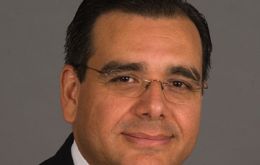MercoPress. South Atlantic News Agency
International
-
Tuesday, November 4th 2008 - 20:00 UTC
Historic high level talks between Taiwan and Beijing in Taipei
Taiwan and China held their first high-level talks in Taipei in 60 years on Tuesday, with communications, transport and food safety high in the agenda.
-
Tuesday, November 4th 2008 - 20:00 UTC
Spanish civil war descendents can apply for citizenship

Descendants of people who fled Spain during the country's civil war are to be allowed to apply for citizenship. The decision will allow an estimated 500,000 children and grandchildren of civil war-era exiles to seek to return.
-
Tuesday, November 4th 2008 - 20:00 UTC
Profits down 34% at Marks & Spencer
Marks & Spencer's half-year profits have fallen by a third after sales suffered in the toughest conditions to hit the retailer since the early 1990s.
-
Tuesday, November 4th 2008 - 20:00 UTC
World Bank official warns on soaring number of poor in 09

The world financial crisis influenced by the high prices of food and fuel will cause global growth to drop 1 to 2%, together “with the emergence of millions of poor, a new underclass”, according to a top official from the World Bank.
-
Tuesday, November 4th 2008 - 20:00 UTC
Fitch predicts steepest GDP decline in leading countries

In its latest Global Economic Outlook, Fitch Ratings predicts that the world's major advanced economies - US, UK, Euro Zone and Japan - will experience in 2009 the steepest decline in GDP since World War II. In aggregate GDP growth in these countries is expected to be (minus) -0.8% in 2009, compared to an estimated 1.1% for 2008. Tighter credit conditions, consumer retrenchment and falling corporate investment are expected to combine to deliver an unusually synchronised downturn across the advanced economies.
-
Monday, November 3rd 2008 - 20:00 UTC
UN convoy of food and medicine for displaced Congolese

United Nations is to send a convoy of food and medical supplies to help the 250,000 people displaced by recent fighting in the Democratic Republic of Congo. It will be the first aid in a week for those stranded in areas controlled by renegade Gen Laurent Nkunda's forces.
-
Monday, November 3rd 2008 - 20:00 UTC
Prince Charles: rich countries should pay annual “utility bill”

Britain's Prince Charles has called for rich countries to pay an annual “utility bill” for the benefits given to the world by its rainforests. Speaking in the Indonesian capital, Jakarta, the prince called rainforests the “world's greatest public utility”. They act as an air conditioner, store fresh water and provide work, he said.
-
Monday, November 3rd 2008 - 20:00 UTC
EU in recession: 0.1% growth in 09 and 0.9% in 2010

European Union finance ministers on Monday opened in Brussels two days of talks aimed at coordinating proposals for a new global financial order while prospects for the EU real economy continued to deteriorate.
-
Monday, November 3rd 2008 - 20:00 UTC
IMF says China remains “robust” but '09 is “difficult year”

China's economy will slow but should remain relatively strong and help to support the rest of Asia, the International Monetary Fund said on Monday, predicting a very difficult year for the global economy in 2009.
-
Sunday, November 2nd 2008 - 20:00 UTC
Archaeologists find evidence of Defoe's Robinson Crusoe
Archaeologists uncovered what they think is evidence of the campsite of a ship-wrecked sailor said to be the inspiration for Daniel Defoe's Robinson Crusoe. The archaeologists' findings were published in the journal Post-Medieval Archaeology.
